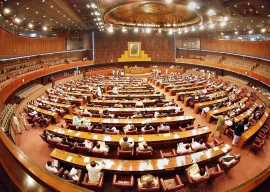
A US lawmaker has introduced a bill titled “Stopping Pakistani Terror Act” in the Congress that seeks to designate Pakistan as a state sponsor of terrorism.
The bill tabled by US Congressman Scott Perry on March 8 read, “To provide for the designation of the Islamic Republic of Pakistan as a State Sponsor of Terrorism, and for other purposes.”
The bill introduced in the House of Representatives has been referred to the Committee on Foreign Affairs.
“Effective on the date that is 30 days after the date of the enactment of this Act, the Islamic Republic of Pakistan shall be deemed to be a country the government of which the [US] Secretary of State determines has repeatedly provided support for international terrorism..,” read the bill.
The main categories of sanctions include restrictions on US foreign assistance, a ban on defence exports and sales, financial transactions and others.
The US government will be prohibited to export or “otherwise providing (by sale, lease or loan, grant, or other means), directly or indirectly, any munitions item” to a country subjected to the sanctions mentioned in the bill.
Also read: Bill moved in US Senate to sanction Taliban, supporters
“[US] shall suspend delivery to such country of any such item pursuant to any such transaction which has not been completed at the time the Secretary of State makes the determination..”
The development comes at a time when Pakistan has been facing immense pressure from the West to condemn Russia’s attack on Ukraine.
However, Pakistan has refused to criticise Moscow's actions but it has called for resolving the dispute through dialogue and diplomacy.
Last year, a group of high-profile US senators – including a former presidential nominee – has moved a bill in the US Senate seeking imposition of sanctions on the Afghan Taliban that could also potentially extend to Pakistan.
The bill, titled ‘Afghanistan Counterterrorism, Oversight, and Accountability Act’, triggered an angry rebuke from a senior member of Pakistan’s cabinet.
The 22 lawmakers, all from the Republican Party, introduced the bill that requires “the imposition of sanctions with respect to the Taliban and persons assisting the Taliban in Afghanistan, and for other purposes.”
Pertaining to Pakistan, the bill elaborated that “the first report… shall include – (1) an assessment of support by state and non-state actors, including the Government of Pakistan, for the Taliban between 2001 and 2020, including the provision of sanctuary space, financial support, intelligence support, logistics and medical support, training, equipping, and tactical, operational, or strategic direction; (2) an assessment of support by state and non-state actors, including the Government of Pakistan, for the 2021 offensive of the Taliban that toppled the Government of the Islamic Republic of Afghanistan… (3) an assessment of support by state and non-state actors, including the Government of Pakistan, for the September 2021 offensive of the Taliban against the Panjshir Valley and the Afghan resistance.”










1726140338-01730723472-0/Untitled-design-(42)1726140338-01730723472-0-270x192.webp)







1730706072-0/Copy-of-Untitled-(2)1730706072-0-270x192.webp)
COMMENTS (89)
Comments are moderated and generally will be posted if they are on-topic and not abusive.
For more information, please see our Comments FAQ